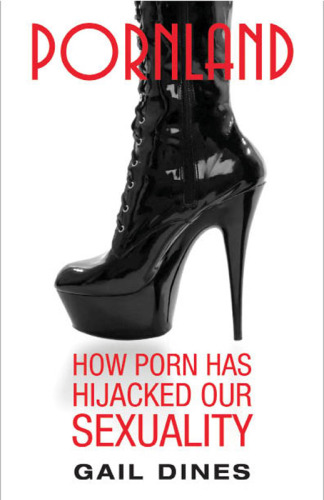
Pornland
How Porn Has Hijacked Our Sexuality
- اطلاعات
- نقد و بررسی
- دیدگاه کاربران
نقد و بررسی

April 5, 2010
As pornography has become both more extreme and more commercial, antiporn activist Dines argues, it has dehumanized our sexual relationships. The radical objectification and often brutal denigration of women in porn, she holds, “leaks” into other aspects of our lives. Dines's argument rests on a compelling, close reading of the imagery and narrative content of magazines, videos, and marketing materials; what is missing, however, is a similarly compelling body of research on how these images are used by viewers, aside from Dines's own anecdotal evidence. The author's appropriation of addiction terminology—viewers are called “users,” habitual viewing is an “addiction,” and pornography featuring teenagers is called “Pseudo-Child Pornography” or “PCP”—is distracting and suggests that rhetorical tricks are needed because solid argumentation is lacking. Likewise, Dines's opponents are unlikely to be swayed by her speculation tying porn viewing to rape and child molestation, nor by the selective sources she draws on to support her point (convicted sex offenders). The book does raise important questions about the commoditization of sexual desires and the extent to which pornography has become part of our economy (with hotel chains and cable and satellite companies among the largest distributors).

May 1, 2010
This book is nothing short of a scathing critique of modern pornography. Dines (sociology & women's studies, Wheelock "Coll.; Pornography: The Production and Consumption of Inequality") convincingly argues that the porn industry has distorted, commercialized, and repackaged sexuality for both men and women. As a prosex, antiporn feminist, Dines is disturbed by the mainstreaming of porn into popular culture and the increasing brutality of hard-core pornography. Although her cause is honorable and her argument sound, Dines's sexually explicit descriptions of pornographic web sites (often with text quoted verbatim) and movies render this an extremely uncomfortable read. Owing to the fine line between exposing exploitation and re-exploiting victims by exposing their stories, Dines makes a valiant effort at truth telling. Yet "Pornland" often feels like the same slideshow of violence and sexual abuse it is trying to prevent. It's clear that Dines intends to jolt her readers out of complacency by showing the violent extremes of hard-core pornography, but this tactic is a miss. More compelling is her thoughtful analysis of pornography's infiltration into the American economy, its detrimental effects on the sexual and emotional health of women and men, and its ability to perpetuate both sexism and racism. VERDICT Although intended for a popular audience, this will appeal only to other scholars interested in the social issues surrounding pornography.Veronica Arellano, Lexington Park, MD
Copyright 2010 Library Journal, LLC Used with permission.

June 1, 2010
Dines takes on the scourge of pornography and its permeation of all facets of culture in this history and call to action: We are in the midst of a massive social experiment, and nobody really knows how living in Pornland will shape our culture. What we do know is that we are surrounded by images that degrade and debase women and that for this the entire culture pays a price. Generously referenced, Dines screed carefully builds her case that pornographys pernicious influence is a factor in the rise in brutishness and sexual violence, focusing specifically on how heterosexual pornography negatively impacts women. She has no time for arguments that so-called softer genres might be acceptable, and she goes into detail in explaining her reasoning. Perhaps she imputes too much significance to current flavors in the never-ending commodification of porn, but her purpose is to offer a compelling explanation of an issue that often makes Americans uneasy. A good, provocative title, but it should be remembered that to adequately discuss porn, one must adequately describe it.(Reprinted with permission of Booklist, copyright 2010, American Library Association.)




دیدگاه کاربران